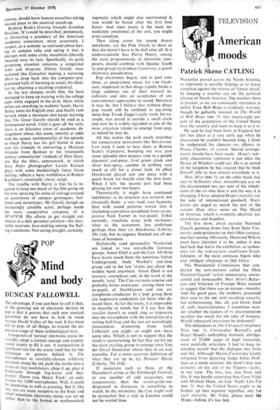TELEVISION
American moods
Patrick Skene CATLING
Westerlies prevail across the North Atlantic, so television is sensibly helping us to brace ourselves against the storms of 'future shock' by keeping a weather eye on the political climate of North America. The weather there at present, as we are continually reminded, is awful. Even Bob Hope is evidently worried, though he gallantly insisted, in The World of Bob Hope (Bec 1), that ninety-eight per cent of the population of the United States love the country and want to keep it as it is. He said he had been born in England but left this place at a very early age when he discovered he couldn't become king. I think he underrated his chances—no offence to Prince Charles, of course. Special arrange- ments should have been made: Hope's radi- antly chauvinistic optimism is just what the House of Windsor could use. He is so proud of the kingdom he has created that he finds himself able to love almost everybody in it.
Man Alive (BBc 1), on the other hand, has cast its brilliantly clear, misanthropic eye on the discontented two per cent of the inhabi- tants of the us who hate it and the way it is changing. I have adopted Hope's statistics for the sake of international goodwill. Wart- lovers are urged to watch the rest of the current Man Alive series on The Mood of America, which is evidently idealistic but murderous and hopeless.
The first show, about panicky National Guards gunning down four Kent State Uni- versity undergraduates on their Ohio campus, was hair-raising. Obviously, Desmond Wilcox must have intended it to be, unless it was bad luck that led to the exhibition, as spokes- men for the mid-western small-town Estab- lishment, of the most cretinous bigots who ever pledged allegiance to Old Glory.
The Presidential Commission that con- ducted the post-mortem called the Ohio National Guards' action unnecessary, unwar-
ranted and inexcusable. Man Alive's Rotar- ians and Veterans of Foreign Wars seemed
to suggest that there was an excuse—insanity.
And the good guys, the students, presented their case to the anc with touching sincerity
but embarrassing, like, uh, you know, kind of, well, inarticulateness. I sometimes won- der whether the makers of -ry documentaries sacrifice too much for the sake of honesty. Would rehearsed interviews be dishonest?
The defendants in The Chicago Conspiracy Trial (mc I), Christopher Burstall's and Stuart Hood's enthralling dramatic abridge- ment of 23.000 pages of legal transcript, were painfully articulate. I had to keep re- minding myself that the dialogue was from real life. Although Morris .C,arnovsky kindly refrained from depicting Judge Julius Hoff- man as a senile monster, the show's bias was certainly on the side of the Yippies—justly, in my view. The bias, too, was from real life. It was hardly surprising that Gore Vidal told Michael Dean, on Late Night Line-Up (Bac 2), that the United States ought to be
broken up into separate republics, one for each minority. Mr Vidal, please meet Mr Hope—before it's too late.






































 Previous page
Previous page